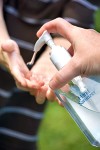 According to a study, about 1 in 5 people will come down with a cold within a week of flying. It’s unclear what causes this increased susceptibility, because at this time there is no link between the recirculated air in airplane cabins and colds. Then why might we get sick after flying? There is less oxygen available in the air, and the air is very dry. The mixture of this two conditions can make you sick.
According to a study, about 1 in 5 people will come down with a cold within a week of flying. It’s unclear what causes this increased susceptibility, because at this time there is no link between the recirculated air in airplane cabins and colds. Then why might we get sick after flying? There is less oxygen available in the air, and the air is very dry. The mixture of this two conditions can make you sick.
Tips to Stay Healthy on a Flight
- Watch what you eat. If you are lucky enough to get a meal during your flight, think smart about what you consume. Many airliners now serve lighter meals, but they may still have high amounts of sodium, fat and calories. Also, avoid foods that give you gas both during and before your flight. In the air, your bodily gasses expand (think pain and bloating).
- Increase your immunity. Infortunately, airplanes do have germs in the air. Most airlines now have in-plane filters that can trap germs, but there is still a chance you can get sick. Prior to your flight, boost up your immunity by getting lots of sleep, exercising, eating right and keeping stress levels low.
 Bring hand sanitizer/wash your hands. Better to be safe than sorry. Clean your tray before and after to eat
Bring hand sanitizer/wash your hands. Better to be safe than sorry. Clean your tray before and after to eat  and wipe down the seat belt and other items around your seat.
and wipe down the seat belt and other items around your seat.- Drink water. Drink lots of water before, during and after your flight to avoid dehydration. Staying hydrated also helps curb jet lag. Caffine and alcohol dehydrate the body more, so avoid these beverages.
- Bring lotion and chap stick. Since the air is dry your skin and lips will lose moisture.
- Wear glasses. If you wear contacts and/or have dry eyes, wear your glasses instead of your contacts during the flight. The dry air can dry out your eyes.
- Chew gum, and yawn. If you are prone to having pressure in your ears (or have a cold, or sinus issues) gum and yawning may help to relive the built up pressure.
- Keep your blood moving. Being in a sedentary position for a prolonged period of time can do harm to your body by possibly causing blood clots, swelling and muscle cramps. Get up and walk around every few hours (if allowed), stretch while seated or when standing, and elevate your feet if possible. If you have swelling in your legs or feet for 24 hours after your flight-see a doctor
 immediately.
immediately. - If you are sick, consider postponing flying. Those with certain medical conditions or injuries should not fly until they are cleared by their doctor. But if you have a severe cold, stomach flu, etc, consider staying put. Not only will it help you get better faster, you won’t spread your illness to other passengers.
Have to grab food on the run? Think smart about your choices and plan ahead.
Click here to see food and beverage choices at O’Hare & Midway airports.
Sources; USA Today, ABC News, Forbes, MSN
